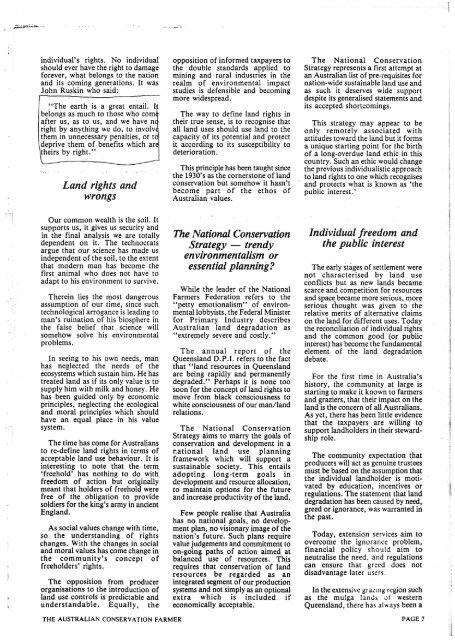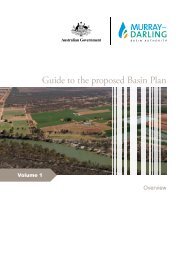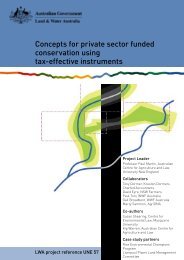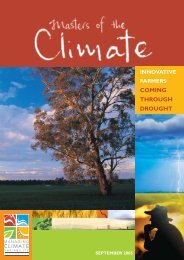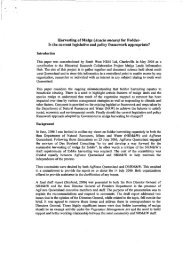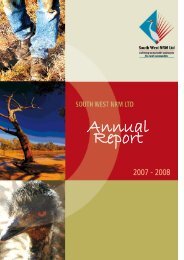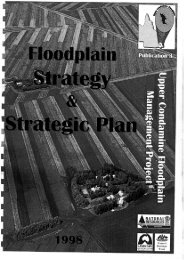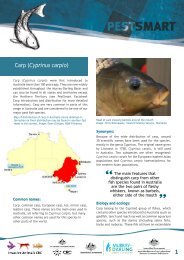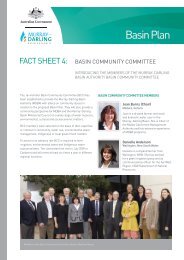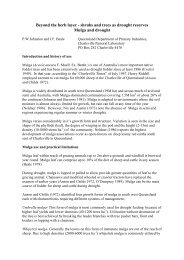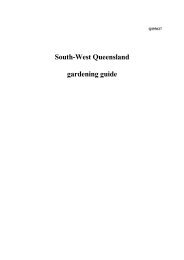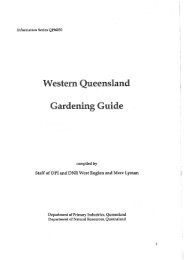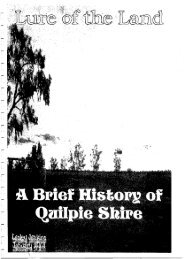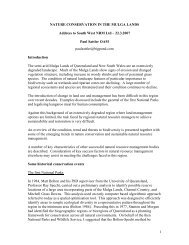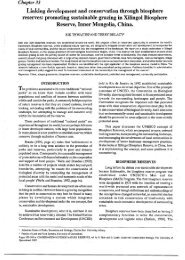soil-conservation-people-religion-and-land.pdf - South West NRM
soil-conservation-people-religion-and-land.pdf - South West NRM
soil-conservation-people-religion-and-land.pdf - South West NRM
You also want an ePaper? Increase the reach of your titles
YUMPU automatically turns print PDFs into web optimized ePapers that Google loves.
individual's rights. No individual<br />
should ever have the right to damage<br />
forever, what belongs to the nation<br />
<strong>and</strong> its coming generations. It was<br />
John Ruskin who said:<br />
"The earth is a great entail.<br />
gs as much to those<br />
US, as to us, <strong>and</strong> w<br />
by anything we do,<br />
in unnecessary pena<br />
ve them of benefits<br />
opposition of informed taxpayers to<br />
the double st<strong>and</strong>ards applied to<br />
mining <strong>and</strong> rural industries in the<br />
realm of environmental impact<br />
studies is defensible <strong>and</strong> becoming<br />
more widespread.<br />
The way to define l<strong>and</strong> rights in<br />
their true sense, is to recognise that<br />
all l<strong>and</strong> uses should use l<strong>and</strong> to the<br />
capacity of its potential <strong>and</strong> protect<br />
it according to its susceptibility to<br />
deterioration.<br />
. - . . This principle has been taught since<br />
the 1930's as the cornerstone of l<strong>and</strong><br />
L<strong>and</strong> rights <strong>and</strong> <strong>conservation</strong> but somehow it hasn't<br />
become part of the ethos of<br />
wrongs<br />
Australian values.<br />
The National Conservation<br />
Strategy represents a first attempt at<br />
an Australian list of pre-requisites for<br />
nation-wide sustainable l<strong>and</strong> use <strong>and</strong><br />
as such it deserves wide support<br />
despite its generalised statements <strong>and</strong><br />
its accepted shortcomings.<br />
This strategy may appear to be<br />
only remotely associated with<br />
i<br />
attitudes toward the l<strong>and</strong> but it forms<br />
a unique starting point for the birth !<br />
of a long-overdue I<strong>and</strong> ethic in this<br />
country. Such an ethic would change<br />
I<br />
the previous individualistic approach 1<br />
to l<strong>and</strong> rights to one which recognises<br />
I<br />
<strong>and</strong> protects what is known as 'the<br />
I<br />
public interest.'<br />
Our common wealth is the <strong>soil</strong>. It<br />
supports us, it gives us security <strong>and</strong><br />
in the final analysis we are totally<br />
dependent on it. The technocrats<br />
argue that our science has made us<br />
independent of the <strong>soil</strong>, to the extent<br />
that modern man has become the<br />
first animal who does not have to<br />
adapt to his environment to survive.<br />
Therein lies the most dangerous<br />
assumption of our time, since such<br />
technological arrogance is leading to<br />
man's ruination of his biosphere in<br />
the false belief that science will<br />
somehow solve his environmental<br />
problems.<br />
In seeing to his own needs, man<br />
has neglected the needs of the<br />
ecosystems which sustain him. He has<br />
treated l<strong>and</strong> as if its only value is to<br />
supply him with milk <strong>and</strong> honey. He<br />
has been guided only by economic<br />
principles, neglecting the ecological<br />
<strong>and</strong> moral principles which should<br />
have an equal place in his value<br />
system.<br />
The time has come for Australians<br />
to re-define l<strong>and</strong> rights in terms of<br />
acceptable l<strong>and</strong> use behaviour. It is<br />
interesting to note that the term<br />
'freehold' has nothing to do with<br />
freedom of action but originally<br />
meant that holders of freehold were<br />
free of the obligation to provide<br />
soldiers for the king's army in ancient<br />
Engl<strong>and</strong>.<br />
As social values change with time,<br />
so the underst<strong>and</strong>ing of rights<br />
changes. With the changes in social<br />
<strong>and</strong> moral values has come change in<br />
the community's concept of<br />
freeholders' rights.<br />
The opposition from producer<br />
organisations to the introduction of<br />
l<strong>and</strong> use controls is predictable <strong>and</strong><br />
underst<strong>and</strong>able. Equally, the<br />
me National Conservation<br />
Strategy - trendy<br />
environmentalism or<br />
essential planning?<br />
While the leader of the National<br />
Farmers Federation refers to the<br />
"petty emotionalism" of environmental<br />
lobbyists, the Federal Minister<br />
for Primary Industry describes<br />
Australian l<strong>and</strong> degradation as<br />
"extremely severe <strong>and</strong> costly."<br />
The annual report of the<br />
Queensl<strong>and</strong> D.P.I. refers to the fact<br />
that "l<strong>and</strong> resources in Queensl<strong>and</strong><br />
are being rapidly <strong>and</strong> permanently<br />
degraded.'' Perhaps it is none too<br />
soon for the concept of l<strong>and</strong> rights to<br />
move from black consciousness to<br />
white consciousness of our madl<strong>and</strong><br />
relations.<br />
The National Conservation<br />
Strategy aims to marry the goals of<br />
<strong>conservation</strong> <strong>and</strong> develo~ment in a<br />
cational l<strong>and</strong> use planning<br />
framework which will support a<br />
sustainable society. This entails<br />
adopting long-term goals in<br />
development <strong>and</strong> resource allocation,<br />
to maintain options for the future<br />
<strong>and</strong> increase productivity of the l<strong>and</strong>.<br />
Few <strong>people</strong> realise that Australia<br />
has no national goals, no development<br />
plan, no visionary image of the<br />
nation's future. Such plans require<br />
value judgements <strong>and</strong> commitment to<br />
on-going paths of action aimed at<br />
balanced use of resources. This<br />
requires that <strong>conservation</strong> of l<strong>and</strong><br />
resources be regarded as an<br />
integrated segment of our production<br />
systems <strong>and</strong> not simply as an optional<br />
extra which is included if<br />
economically acceptable.<br />
Individual freedom <strong>and</strong><br />
the public interest<br />
The early stages of settlement were<br />
not characterised by l<strong>and</strong> use<br />
conflicts but as new l<strong>and</strong>s became<br />
scarce <strong>and</strong> competition for resources<br />
<strong>and</strong> space became more serious, more<br />
serious thought was given to the<br />
relative merits of alternative claims<br />
on the l<strong>and</strong> for different uses. Today<br />
the reconciliation of individual rights<br />
<strong>and</strong> the common good (or public<br />
interest) has become the fundamental<br />
element of the l<strong>and</strong> degradation<br />
debate.<br />
For the first time in Australia's<br />
history, the community at large is<br />
I<br />
I<br />
starting to make it known to farmers<br />
i<br />
<strong>and</strong> graziers, that their impact on the 1<br />
l<strong>and</strong> is the concern of all Australians. i<br />
1<br />
I<br />
As yet, there has been little evidence<br />
that the taxpayers are willing to /<br />
support l<strong>and</strong>holders in their steward-<br />
1<br />
ship role.<br />
The community expectation that<br />
producers will act as genuine trustees<br />
must be based on the assumption that<br />
the individual l<strong>and</strong>holder is motivated<br />
by education, incentives or<br />
regulations. The statement that l<strong>and</strong><br />
degradation has been caused by need,<br />
greed or ignorance, was warranted in<br />
the past.<br />
Today, extension services aim to<br />
overcome the ignorance problem,<br />
financial policy should aim to<br />
neutralise the need, <strong>and</strong> regulations<br />
can ensure that greed does not<br />
disadvantage later users.<br />
In the extensive grar~ ng region such<br />
as the mulga l<strong>and</strong>s of western<br />
Queensl<strong>and</strong>, there has JI ways been a<br />
I<br />
,<br />
THE AUSTRALIAN CONSERVATION FARMER PAGE 7


